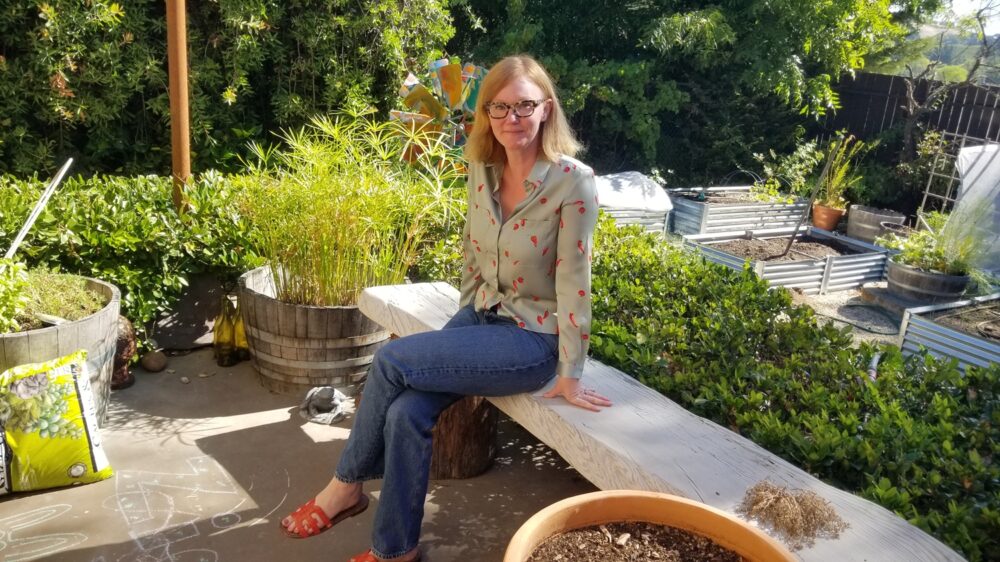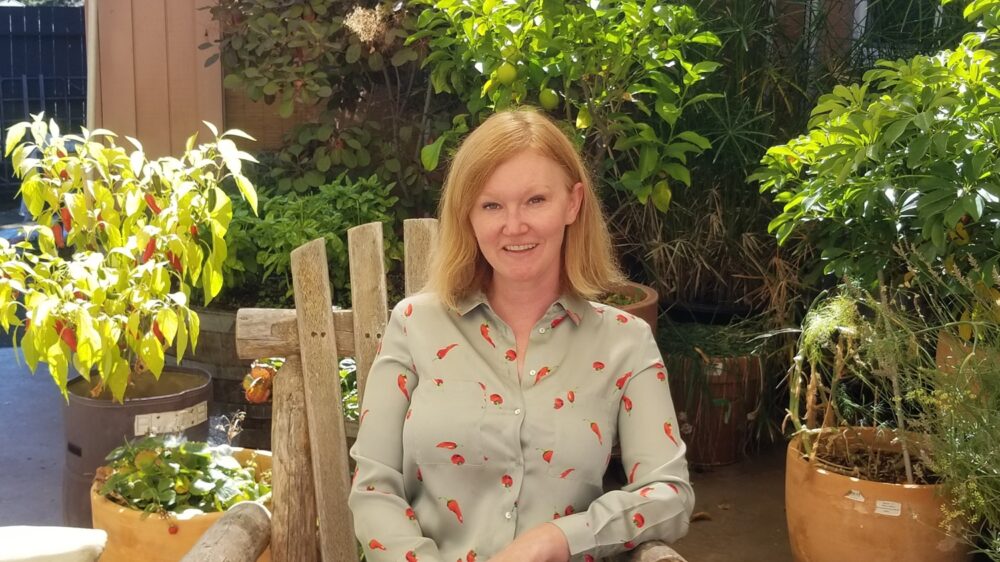
While anxious wine industry pundits pull out their hair worrying about whether wine culture as we know it will go extinct by Labor Day, seasoned wine industry leaders, writers, and educators are busy adding their dynamic energy and passion to our wine culture. (Relax everybody. Wine has been around for thousands of years. It will survive a lousy former surgeon general, some bored and perpetually miserable neo-prohibitionists, and an economic slump, which rhymes with…oh, never mind.)
Enter Kelli White.
Nearly a decade ago, White wowed the wine industry and wine lovers alike with her seminal book, Napa Valley, Then & Now, an in-depth exploration of the history, land, producers, and wines of that storied region, with a generous dollop of tasting notes from older vintages. Now, a decade later, White has re-entered the wine book firmament with a much more down-to-earth offering. Her latest, Wine Confident, finds White’s voice relaxed, purposeful, focused. “It’s the opposite of the Napa book,” she tells me. “It’s short, it’s conversational, and it’s universal.” We’re sitting in White’s backyard, dodging the hummingbirds that gather at one of many hummingbird feeders hanging nearby. They also flit about in the small fruit orchard White and her husband Scott maintain, and from which their 5-year-old daughter Ziggy harvests fresh fruit, her latest obsession. “There are all sorts of ways that wine can improve your life,” she says. “And I wanted to make a really practical case for wine, as well as a more aesthetic one.”
Writing Wine Confident wasn’t White’s idea. “The publisher pitched me on it. Which is the most flattering thing that can happen to a writer.” At first, White didn’t want to write an entry level book because, she says, “I’m a specialist. I dig deep into subjects, and I don’t go broad, but I was so flattered and so intrigued that I said, ‘Okay, I’ll do this.’ And, then I fell in love with the project. Now I think it’s the most important thing I’ve written because, as we’ve talked about in the past. I don’t come from a wine drinking family, and I have a lot of friends outside the wine industry.”
I first met White years ago, when she was a sommelier at Press Restaurant in Napa Valley. Erudite, professional, and relaxed, I was immediately charmed by White. In an industry where elitism still prevails, White struck me as a true lover of wine, which is to say, she’s also a true lover of humanity and nature; the intersection at which this sublime beverage comes into its own. It became clear to me quickly that White isn’t in the wine space to boost her own ego, but rather to connect with others on common ground.
Instead of researching the topic, White allowed her career as a sommelier and wine educator to guide the materials. What were the questions she got asked over and over again? From people from all walks of life and all levels of enjoyment? A list began to emerge. It turns out the concerns people have about wine are universal. “I see how nervous drinking wine makes some people. Because they think they’re doing everything wrong. They didn’t buy the right wine. They don’t have the right wine glasses. Not fancy enough. They aren’t using the right words. And I hate to see that, because I think that wine should be there to improve our lives in whatever capacity we are open to it. The last thing it should do is make anyone feel stressed out, insecure, or vulnerable. And yet, from my time as a sommelier, wine makes people feel really insecure.”
White confronts these concerns head on, demystifying for the nascent wine lover everything from navigating wine lists to interacting with sommeliers. She provides readers with simple, yet smartly written guidelines for everything from buying wines to ascertaining whether a certain wine needs to be decanted. She breaks down how to choose the best glassware for oneself and compels the reader to relax when pairing wine with food. “I wanted to explain things in a real way and not dumb things down too much. But I also wanted to say, relax. Be creative. Have fun! Play! I tried to include as many stories as I can of my own personal embarrassment in my own journey and career with wine.”
When I ask White why so much elitism persists around what is essentially a rather humble fermented beverage, White says, “By definition, wine is a luxury good. It’s not like water or food or utilities.” White also points to traditions surrounding the consumption and enjoyment of wine. She tells me about a wealthy woman who had access to great wines and was confident in her palate and what she liked, but her confidence was easily shaken by a winery tasting room employee who began to cite a long and complicated list of aromatics she ought to pick up in the wines. His demeanor caused her a tremendous amount of anxiety. When she couldn’t identify and name the aromatics the winery employee insisted were present in the glass, she told White, “I guess I just can’t taste wine as well as other people. I must not know how to enjoy it as much, right?” “That’s obviously not true,” White says, “If you can’t smell something and name it, it doesn’t mean you’re not enjoying it as much.” Those kinds of intimidation tactics that some employ around wine are “weird and twisted,” she says.
Despite her well-educated and celebrated palate, White still feels insecure and anxious around wine at times. She cites the natural wine phenomenon as one source of occasional insecurity. Because she cut her teeth on studying very classical wines, White says she feels “very outside that movement. I talk about natural wines very little, but hopefully gracefully. I give natural wines a lot of credit for making young people excited about wine and for attracting a more diverse audience.” She credits natural wines with opening the intellectual doors to the concept of deliciousness. “I can understand when people say they feel alienated by wine, because I feel like an outsider and sort of scared to talk about natural wines. It makes me feel old and ignorant, so I experience my own anxiety around wine.” White is finding ways into the natural wine dialogue by focusing on some of the movement’s tenets, like the importance of holistic farming and limiting inputs in the vineyard and cellar.
The wine industry can be its own worst enemy, and trade publication headlines often become an echo chamber of fear and negativity. Is cannabis replacing wine? Will young people ever drink wine again? For an industry that represents a beverage that is a touchstone of civilization for many cultures, it’s not the most confident look. Like many industries, the wine business occasionally experiences a reset. But if you only read the trades, you’d think wine industry pundits don’t believe themselves when they say that wine matters. White, on the other hand, is a forward-thinking realist. “If some of the more kind of anonymous industrial hyper-tweaked wines go away, because those tend to occupy the lowest price points, I’m fine with that. I think that’s okay, because the most exciting parts about wine are the parts that pertain to agriculture and the humanities. What interests me is not necessarily wine as a product or a commodity; it’s wine as a reflection of the growing season, of place, of human endeavor, vision, and aesthetics. There’s a human-ness and connection to the earth. Super mass-produced wines are usually an expression of something else, in which case, it’s okay by me if hard seltzer eats their lunch.”
Many Napa Valley wines are, by most standards, expensive. And, while there are plenty of relevant brands in Napa Valley making competitively priced wines, like LOLA and St. Supery, the region itself is often associated with luxury pricing. Because White lives in Napa Valley, I ask her if she feels Napa Valley has become too expensive, the wines, the land, the food, the hotels. “I think it’s definitely something that needs to be discussed. The era has passed when a self-made young person could buy a little slice of heaven here, make a business of it.” She shares a story of a winery owner who established her winery in Napa Valley in the 1970’s, when land was still affordable. And though that’s no longer the case in the Napa Valley, the winery owner was quick to point out to White that, currently, she wouldn’t be able to buy land in the Barolo or Burgundy either. These are blue chip regions, as is the Napa Valley, and people are attracted to Napa Valley because of the high-quality fine wines and the level of attention to detail in the hospitality and food sectors. “That’s going to cost more than visiting an emerging region, so though I understand some of the frustration with luxury pricing, I also think it’s an inevitable part of operating at the highest level.”
White’s writing style has changed since her first book. When I ask her about this, she’s quick to share that motherhood informed this stylistic evolution. “Being a mom one hundred percent changed my style of writing.” For her new book, she adopted her normal speaking tone of voice, which, she tells me, is “a little irreverent and hopefully warm.” Before Ziggy was born, White enjoyed visiting the library, engaging in hours of in-depth research into wine. These days, she tells me, “I have this little being I’m trying to raise, and there’s no real margin for my time anymore.” It was while writing in a more casual tone that White allowed herself to become vulnerable to the reader. “I lose a little bit of armor writing in a more casual tone than might be appropriate for a subject so lofty as Burgundy, and yet this tone has gone over well. I’m much more mindful, more efficient, much more strategic. I just have less time for bullshit all around. I’m not going to hang out with people I don’t love. I’m not going to watch TV unless it’s really good TV or really bad TV, because that is also delicious. Life is too short and being a mom has reminded me of that.”


